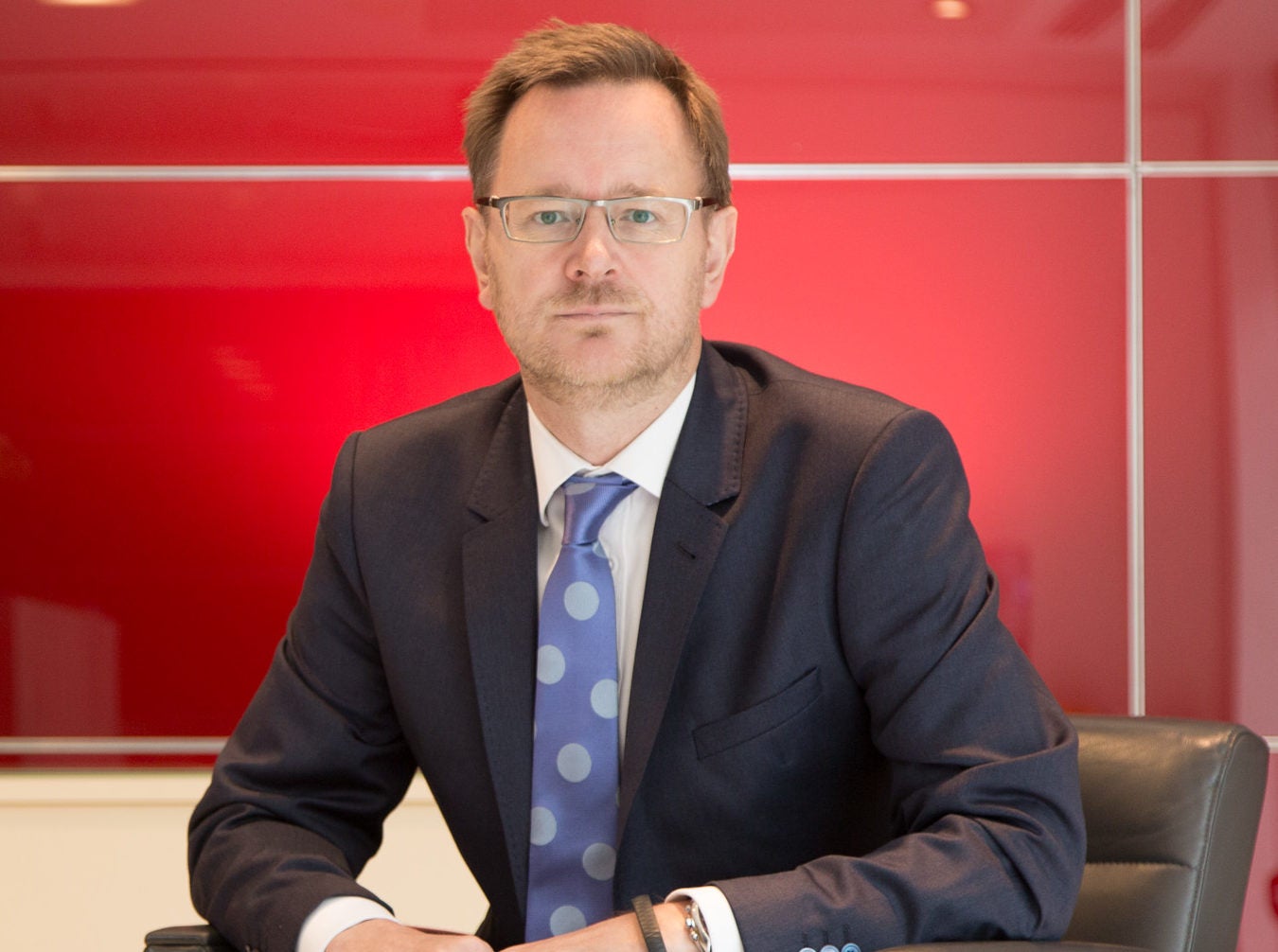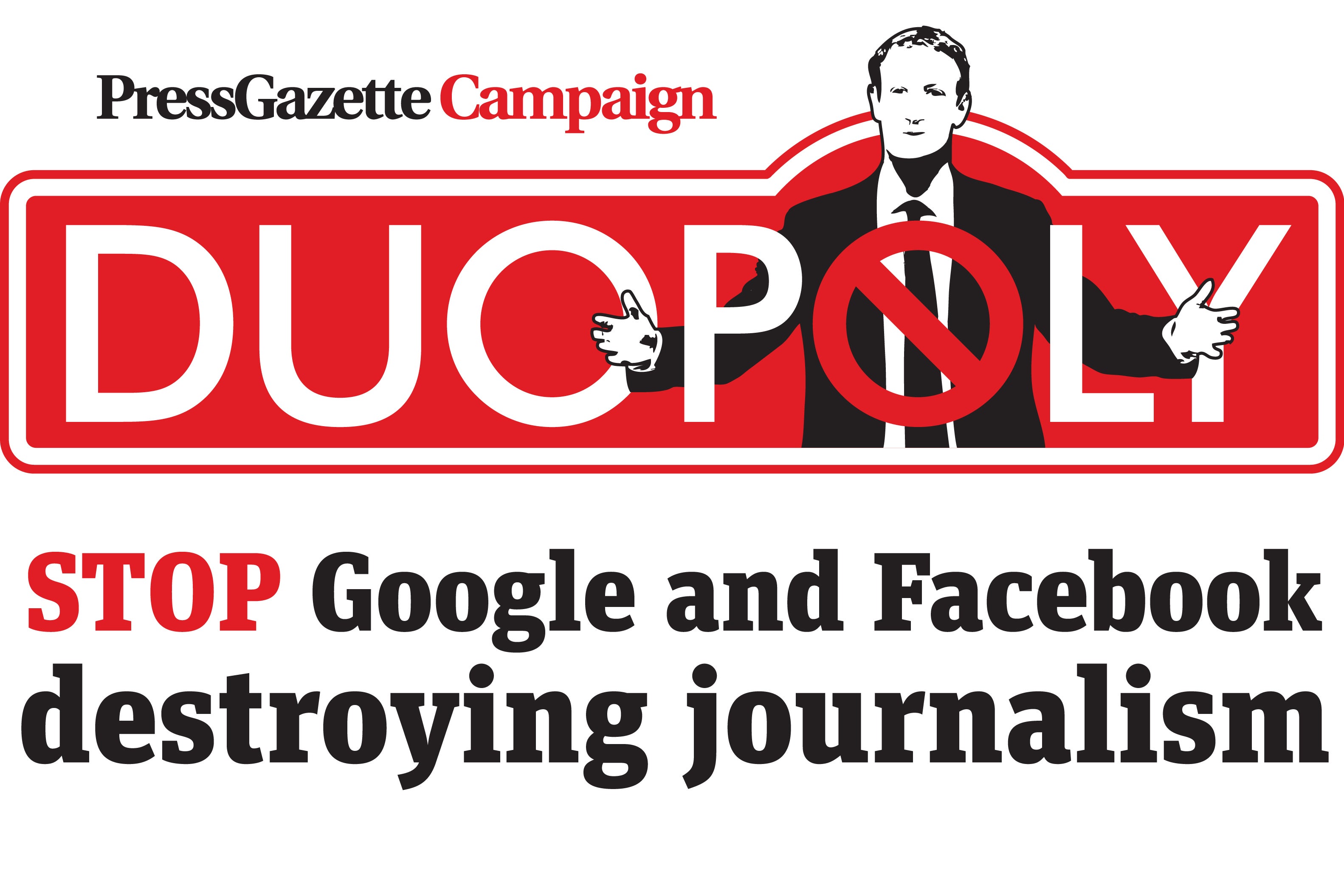
News publishers are “not operating on a level playing field” with Facebook and Google, according to Johnston Press chief executive Ashley Highfield, who says action is needed “to encourage them to see that they are destroying our industry”.
Highfield (pictured) has given his support to Press Gazette’s Duopoly campaign – calling on Facebook and Google to stop destroying journalism and give news publishers a fairer deal for using their content – which he praised for “covering all the right subject areas that need addressing”.
UK advertising hit a record £21.4bn total in 2016 with the Duopoly taking the lion’s share of the money. Together the two web giants are reckoned to take more than half of UK online advertising, expected to climb to 71 per cent by 2020 according to a report by analysts OC&C.
The duopoly also hoovered up nearly all of the UK digital advertising market’s 17.3 per cent growth last year – claiming 1.14bn of the £1.217bn rise.
Highfield described Facebook and Google as presenting “both one of the biggest threats and one of the biggest opportunities facing the UK publishing industry”.
He told Press Gazette: “What I do find surprising is that we have let this go on for so long.
“I think those two organisations have done a very effective job of dividing and ruling between the newspaper publishers who have too long taken potshots at each other and not realised that actually, particularly in the regional press, we’re not actually competing with each other at all – and that the competition for ad dollars has increasingly come just from these two companies.
“Whilst in some ways you could just say they [Facebook and Google] have got a better business model than you, what’s become increasingly clear is that we are not operating on a level playing field.”
He added: “We need to encourage them to see that they are destroying our industry, or are just making very small gestures such as the news initiative which are not actually going to preserve the content creation that they need to power their platforms.”
According to Highfield, Facebook is now contributing “quite often half of all of our traffic” across Johnston Press “and most of the other half of it will probably come from Google”.
The Scotsman and i publisher recently took the decision to use the websites of six of its smaller Scottish weekly titles to signpost readers directly to Facebook rather than post news content on their website.
Along with regional dailies including the Yorkshire Post and Portsmouth News, Johnston Press publishes 154 paid-for weekly titles and 37 free newspapers and their corresponding websites.
Said Highfield: “On the one hand we are reliant on them [Facebook and Google] for the majority of our traffic. But clearly, where the business model sees nine in every ten dollars going to those two platforms… clearly the business model is wrong.
“But because it’s totally unregulated, there’s nothing to say that these two companies ought to be currently giving back more to the creators of the content. But it surely can’t be right that we create, as an industry, two-thirds of the content, but only get 10 per cent of the revenue.”
Highfield said that after a meeting with Culture Minister Matt Hancock he believed the government had “finally recognised that this model is unsustainable” after “many years of having been extremely effectively lobbied by Google and Facebook”.
Though he warned the government no longer want to hear the “industry’s rather undirected moans”, adding: “They want to hear exactly what they should support with the industry that would help change this media ecosystem. So what we have got to do now, as an industry, is work out what the right model looks like.”
He said there were “probably three or four emerging models that need the industry to come together to really look at seriously”.
“I think there has been some good progress already on kite-marking, such that both Google and Facebook would promote properly kite-marked content that came from trusted publishers”, he said – adding:”I think that is one idea, one initiative which I think has got legs.
“But then the changing of the business models such that our content gets a greater share of any remuneration – that still needs to be worked through.
“And then the third idea, which I think is gaining some interest amongst the government, is whether Google in particular ought to be levied.
“In the gambling industry the gambling operators, like Ladbrokes, have to pay a levy to the content creators at the race courses to actually make sure that the race courses and the content of horse racing and the filming thereof is long-term viable because obviously gambling requires that.
“Is there a similar model, given that model has been tried and tested, where Google would have a levy placed on it that would help go towards the funding of content that they then exploit?”
Asked which of these potential models he favoured, Highfield said: “I genuinely think it’s too early. I think that we need to get through the election.
“Certainly the Tory manifesto has some specifics in it relating to reviewing the Google and Facebook hegemony, so I think that’s where you would start.
“The Conservatives have said to me directly that they would be interested if the industry could come up with a model, i.e. if we and Facebook and Google could come up with a model, that they could then support that might favour kite-marking and the promotion of quality content route.
“I think the government would probably have to go further if it wants to make something like a levy work, however I think the government appetite could well be there and I think we should take that opportunity seriously and not just put it in the ‘too hard’ basket.
“I think when we started to work with the BBC [on the Local News Partnership] a lot of people thought it was going to be too difficult, but we got there by the industry being solidly in alignment and with strong government support. I’m pretty sure we could do something, but we shouldn’t under-estimate the phenomenal lobbying that Facebook and Google will do against this.”
He said working on a solution to the Duopoly’s dominance was “certainly something that is already in the works”, adding: “I think the industry is certainly in alignment that we need to do something and that we should not try and fight on too many fronts, but probably focus on a sustainable economic model and how Government could help get there. That detail needs to be worked through over the coming weeks and months.”
But, he warned: “What we mustn’t do is take too long on this.
“Following the election result next week there may be an opportunity measured in days and weeks rather than months and years to work with the government to come up with a policy framework and we will have stolen defeat from the jaws of victory if we as an industry can’t get our act together.”
That of course, according to party election manifestos, would depend on a Conservative victory at the polls on 8 June. But Highfield says the industry “can’t wait any longer” to act.
If the industry fails to change the status quo, whereby the Duopoly continues to claim an increasingly larger slice of the advertising pie then he said “it would become an increasingly tough industry to operate in”.
“All of us would need to find other revenue streams, as we are all trying to do, and all of us would need to keep a very tight control on costs, as we all currently are doing,” he said.
“If OC&C’s numbers are right that Press Gazette reported on, clearly there are going to be more and more pressures on the players who are still here.
“I would hate to see further diminution of our industry, but it would be inevitable unless we can come to a better arrangement with Google and Facebook.”

In order to move forward towards a solution, Highfield said it was necessary for the news media industry to “accept what’s happened as what’s happened” regarding the enormous changes Facebook and Google have wrought on the news industry and “draw a line under it and say ‘where do we want to go from here?’”
He said he saw the recent “momentum” to tackle the Duopoly – following the rise of fake news concerns in the US and UK and Times investigations revealing the placement of advertising next to unsavoury content – as providing “an opportunity of getting our industry back into growth”.
“It has a real positive potential in turning around ten years of decline, which started many years ago when Google and other American giants effectively killed the classified business within the news industry,” he said.
“I think there’s been a big wake-up call [for marketing officers] now and they realise the context where their adverts appear is highly important not just reputationally, but the effectiveness of the advert – people are more likely to click through when they are in the right mindset against the right content.
“And I think it’s really up to us as an industry to really push that message home individually and collectively. I think that our pushing that message home to advertisers – ‘you want to be in quality environments’ – may or may not align with what Google and Facebook’s messages are through their ad exchanges and ad networks.
“And I think the work we have got to do is to try and make sure that they do align, that our interests do align with theirs. Clearly there is an enormous amount of work to do, but I am optimistic we can come out with a solution.”
He said it was important to “turn the language” of the struggle for change from “one of opposition into one of ‘what works for everyone?’.
“I think if [the Duopoly] take more responsibility, probably through regulation, and admit they are publishers and therefore it is in their interest to carry quality news, then it would be in the whole industry, the whole ecosystem’s interest to ensure that they credit our quality news through something like kite-marking, and promote our quality news, and give us a fairer share of the advertising revenue,” he said.
“I think there is a win-win-win situation where government can get in more media plurality and less fake news, the two American giants can end up with a better quality of content on their platform and we can end up with a fairer split of the ad revenues.”
Email pged@pressgazette.co.uk to point out mistakes, provide story tips or send in a letter for publication on our "Letters Page" blog
